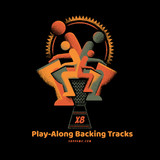Kids Love Drumming!
You may be hard-pressed to find someone who doesn't like drumming. Sure, there are people out there who don't like certain genres of music and those genres may be what pop into their heads if you ask them what they think about drumming, but all you have to do is put a drum out where people can touch it to see that drums are difficult to resist. Maybe even impossible. Due to this seemingly preternatural human response to the drum, it makes perfect sense that kids love drumming. The issue is that, sometimes, adults don't always love that kids love drumming.
If you find yourself in the tricky position of wanting to support a child’s musical interests while simultaneously resisting any desire to listen to said child bang away on a drum kit, our sympathies are with you. Living with a child who believes drumming to be the key to a fulfilling life can bring about feelings of desperation. Drums are loud and kids are often loud and together they may seem deafening. However, there are ways to encourage kids who love drumming without applying for sainthood.
First, you will need to set limits. Life amongst human beings is about boundaries and you and the drumming prodigy in your life will need to sit down and come up with a mutually beneficial practice schedule. Yes, kids love drumming, but it is important that it is a healthy love. Establishing a routine not only helps give focus to time spent at the drum, but it also allows the resistant adults involved an opportunity to train their own attitudes and behaviors.
Drum pads are a wonderful investment, regardless of the kid’s passion levels. By using them, the child can drum more often and in more environments without disturbing anyone. Hand drums, like djembes or bongos, can also be a solution if noise is a problem, while still giving a child an outlet for his or her love of rhythm. Drumming is often a community-building exercise, so take advantage of this opportunity to discuss how drumming affects your family, household, or neighborhood. Drumming is great, and practicing compassion and consideration will take everyone further in life.
Kids love drumming for a variety of reasons. Some enjoy the creative aspect, others benefit most from the stress relief, and many simply want to be heard. Providing formal lessons and/or drumming mentors may help a child tap into different values and develop character. Drums, like most things in life, challenge us to demonstrate our higher or baser natures. Take this chance to bond and practice a healthy relationship with your drummer, because the more emotional someone is about something, the easier it is to help create a positive experience and fond memories.
Recent Posts
-
X8 Drums Play-Along Backing Tracks
The new X8 Play-Along Series is being produced for our musician friends wanting a fresh way to work …9th Feb 2025 -
What is the Best Size Djembe for Beginners?
If you're new to the world of percussion and interested in learning the djembe, you're in for a t …16th Jul 2024 -
The Benefits of Becoming a Drumming Teacher: Transforming Passion into Profession
Why become a drumming teacher? Becoming a drumming teacher is an excellent way to share your pas …22nd May 2024




